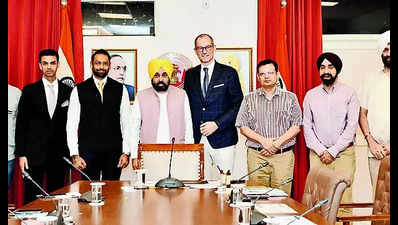Editor's Note: Despite challenges such as a National Assembly dominated by opposition parties and historically low approval ratings, the Yoon Suk-yeol administration has been recognized for its achievements on the diplomatic stage. Even amid difficult domestic political conditions, the Yoon administration has been expanding its international presence by addressing various diplomatic challenges, including strengthening the South Korea-U.S.
alliance, improving Korea-Japan relations, and promoting global economic cooperation. This series will review the diplomatic achievements of the Yoon administration, their background, and future tasks. The core of the Washington joint statement is to strengthen cooperation between NATO and the Indo-Pacific region.

Specific discussions on 'security issues' in the region. In the bilateral meetings held on the occasion of the NATO summit, the South Korea-U.S.
relationship was upgraded to an alliance based on 'nuclear capabilities'. It includes not only deterring North Korea's nuclear threats, but also 'responding' to them. It was also confirmed that Germany has applied to join the UN Command.
[Cheonji Daily = Reporter Kim Sungwan] NATO has traditionally been a political and military alliance representing the Western bloc. Despite its name, it had little geopolitical relevance to us, but there are assessments that it has become much closer since the inauguration of the Yoon Seok-yeol government. Unlike before, President Yoon has been attending the summit of NATO member state leaders annually and engaging in communication.
This year, in particular, foreign media outlets in the West are praising President Yoon's participation as timely, linking the Ukraine war and tensions on the Korean Peninsula to the new Sino-Russian treaty. Some experts also say that the administration has solidified alliance diplomacy amid the rapidly changing international situation. However, many in the diplomatic community believe that the "Korean version" of the NATO summit is closely tied to the unique circumstances of the Ukraine war.
There is an explanation that the Ukraine war is a "sales pitch" for the West, including the United States, to provide lethal weapons support that they are struggling with. This is because the Yoon government's one-sided military and security cooperation is not only pushing the Northeast Asia region, but also broadly the Indo-Pacific region, into a new Cold War confrontational structure. This is in line with the observation that the long-cherished American goal of a "Asian version of NATO" centered on the ROK-US-Japan is being actively pursued as a containment mechanism against North Korea, China, and Russia.
South Korea has been invited to the NATO summit held in Washington for the third consecutive year, together with the leaders of Japan, Australia, and New Zealand. A NATO+IP4 (South Korea, Japan, Australia, New Zealand) system has been established. This defines the connection between NATO and the Indo-Pacific region.
At the NATO summit held in Washington, D.C. on the 11th (local time), key issues such as the deepening of North Korea-Russia relations, response to the Ukraine war, containment of China, and responses to new security threats were discussed intensively.
In the joint statement of the Washington summit, NATO leaders expressed concern over the deepening of relations between North Korea and Russia, and strongly condemned North Korea's export of artillery and ballistic missiles to Russia. North Korea and Iran's direct military support for Russia was also an issue. NATO allies agreed to strengthen their support for Ukraine in the war.
This shows that NATO has no intention of responding to the ongoing peace negotiations. This is why the possibility of the war prolonging is expected. However, Ukraine's NATO membership is expected to be difficult for now.
In addition, NATO recognized China's rise as a new security threat and sought joint countermeasures. Measures against China's military buildup, technological competition, and the expansion of geopolitical influence were the main focus of the discussions. Cooperation between IP4 and NATO was also strengthened.
The reason was that the security of the Indo-Pacific region and the Atlantic Europe are directly related, and NATO mentioned cooperation in areas such as support for Ukraine and cyber defense. President Yoon's NATO debut was in June 2022, two years ago, in Madrid, Spain. Just 50 days after his inauguration, he chose NATO as the destination for his first overseas visit as president.
The Yoon government put forward "value diplomacy" and "becoming a global pivotal state" as the rationale for attending NATO. However, when Choi Sang-mok, the president's closest economic aide and the current Minister of Planning and Finance, made a virtual "declaration of decoupling from China," there were observations that the administration's real intention was not global diplomacy beyond Northeast Asia, but rather an anti-China front. In fact, South Korea-China relations have since deteriorated and remain in a stalemate.
In July last year, the summit was held in Vilnius, the capital of Lithuania. More attention was drawn to the news of First Lady Kim Keon-hee visiting luxury shops in Vilnius accompanied by the presidential security team, and President Yoon's unexpected visit to Ukraine, which is engaged in conflict with Russia, where he urged them to "fight Russia with the spirit of life-or-death." It was clear that his attendance at the NATO summit this year also drew significant interest.
Moreover, the military cooperation in Northeast Asia and the NATO alliance across the Eurasian belt have led to the close ties between North Korea and Russia, which also heightened the possibility of pressure on weapons support for Ukraine. This year, more specific measures were discussed on security issues such as concerns over the deepening of North Korea-Russia relations, cooperation with Indo-Pacific countries, containment of China, and responses to the Ukraine war. Most notably, Russia, North Korea, Iran, and China were identified as countries that undermine security, and NATO, which was originally aimed at the Soviet Union, has further revealed its hostile stance towards North Korea and China since the Madrid summit two years ago, when it decided to expand its role to the Asia region.
This is in line with the Yoon government's foreign policy orientation. President Yoon also emphasized that the security of Northeast Asia and NATO cannot be separated. This reflects the reality that the security of Europe and Asia are interconnected, and actively responds to the long-held diplomatic strategy of the United States.
Furthermore, South Korea promised to provide 33 billion won in support for Ukraine. It is also reported that President Yoon held a meeting with Ukrainian President Volodymyr Zelenskyy, but the content of the conversation was not disclosed, raising suspicions about the possibility of military support. There are criticisms that the Yoon government's deeper involvement in the Ukraine war and NATO's deeper engagement in Northeast Asia could become the seeds of another conflict.
Among the bilateral meetings held on the occasion of the NATO summit, the South Korea-U.S. summit meeting was particularly noteworthy.
The two leaders adopted the "Joint Statement on the ROK-U.S. Extended Deterrence Strategy and Consultation Mechanism," which includes the contents of an integrated nuclear and conventional deterrence involving U.
S. nuclear assets and South Korea's conventional forces. This means that the South Korea-U.
S. alliance has been upgraded from a conventional force-centered relationship to one based on nuclear capabilities. The key point, according to the presidential office, is that the joint statement officially documented the integration of the ROK-U.
S. nuclear and conventional forces, including in response to North Korea's nuclear threats, for the first time. This has led to the view that the U.
S. nuclear policy is shifting from a focus on nuclear deterrence to the possible use of nuclear weapons. However, the diplomatic community believes that this is likely a declarative guideline and may only entrench the new Cold War confrontation structure in Northeast Asia.
One diplomatic source familiar with the matter said it would be fortunate if the ROK-U.S. alliance is seen as a horizontal relationship, not a hierarchical one.
The joint statement is the result of the ROK-U.S. Nuclear Consultative Group (NCG).
It was produced about a year after the group was launched in July last year, following the "Washington Declaration" adopted during President Yoon's state visit to the U.S. in April last year.
The NCG is a bilateral consultative body to ensure capabilities to strengthen extended deterrence through joint nuclear and strategic planning against the North Korean nuclear threat. However, there are many concerns, such as the massive cost of operating nuclear assets, how they will be used, and the possibility of becoming an obstacle to the peace process on the Korean Peninsula. Both inside and outside the diplomatic community, there are worries that the Yoon government may have made concessions behind the scenes, possibly in exchange for weapons support for Ukraine.
The meeting between President Yoon and German Chancellor Olaf Scholz also drew attention in relation to the ROK-U.S. moves to expand the UN Command.
In November last year, a meeting of the defense ministers of the UN Command participating countries was held in Seoul, signaling a push to expand and revitalize the UN Command. President Yoon confirmed that Germany has applied to join the UN Command. Germany's joining the UN Command would be the first case of a country that did not participate in the Korean War sending its military to the UN Command.
This indicates that the expansion of the UN Command is becoming a reality, and Japan is likely to be next. The problem is that the U.S.
is trying to reorganize the UN Command as a combat command. The reactivation of the UN Command, which had only been maintained in name, is seen as the U.S.
intention to continue exercising operational control even after the transfer of wartime operational control to South Korea in the event of a crisis on the Korean Peninsula..


















